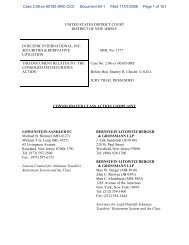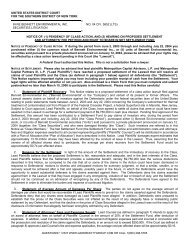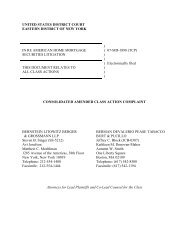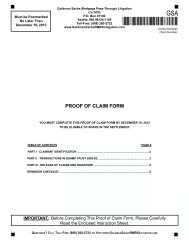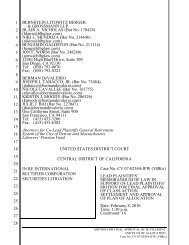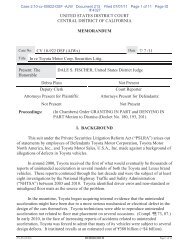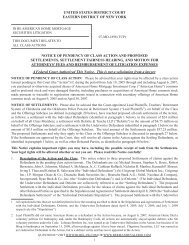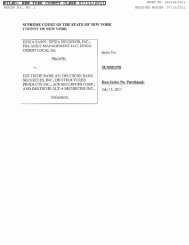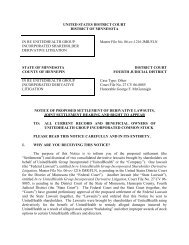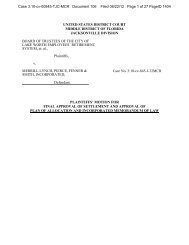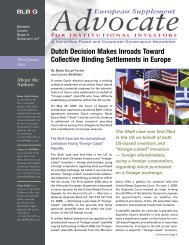to view the Lawdragon's - Bernstein Litowitz Berger & Grossmann LLP
to view the Lawdragon's - Bernstein Litowitz Berger & Grossmann LLP
to view the Lawdragon's - Bernstein Litowitz Berger & Grossmann LLP
You also want an ePaper? Increase the reach of your titles
YUMPU automatically turns print PDFs into web optimized ePapers that Google loves.
Lawdragon Q & A with:Peter BiCKsbY John rYan500The type of litiga<strong>to</strong>r who makes <strong>the</strong>Lawdragon 500 guide varies, but inevitably that personbrings a certain extra quality or characteristic thatmakes him or her deserving of <strong>the</strong> elite distinction. ForPeter Bicks, who also heads Orrick’s New York office,it’s an impressive track record of winning cases orearning favorable settlements in a range of high-stakescommercial, mass <strong>to</strong>rt, product liability and intellectualproperty disputes – regardless of <strong>the</strong> jurisdiction inwhich he may find himself.Bicks first captured our attention with his work forone of his regular clients, Union Carbide Corp.; hisdefense in 2004 against billions of dollars of claimsbrought by <strong>the</strong> Kelly-Moore Paint Co. in a Texas statecourt trial was among <strong>the</strong> most highly <strong>to</strong>uted defenseverdicts of <strong>the</strong> past decade.More recently, he successfully defended Nintendoagainst patent infringement claims by Motiva over <strong>the</strong>popular Wii game system. That case originated in federalcourt in <strong>the</strong> Eastern District of Texas but landedbefore <strong>the</strong> International Trade Commission, whereBicks prevailed in a 2011 bench trial against s<strong>to</strong>riedtrial lawyer Mark Lanier (who was also <strong>the</strong> plaintiffs’lawyer in <strong>the</strong> Kelly-Moore case).LAWDRAGon: You’ve had experience in a wide range ofjurisdictions, but had you been before <strong>the</strong> ITC before?And did you find any aspect of <strong>the</strong> process particularlychallenging or enjoyable?PETER BICKS: I had never tried a case before <strong>the</strong> ITCuntil last summer and I loved it. Winning is always athrill, particularly when you have a great client, highstakes, and a great Orrick team behind you, as I did.The ITC does present unique challenges: The judgemanages <strong>the</strong> clock <strong>to</strong> <strong>the</strong> minute, so wisely using timeis absolutely essential. In a five-day trial, 15 live witnesseswere presented. The direct testimony is presentedin writing, so a premium is placed on crossexaminationskills and efficiency. And <strong>the</strong> proceduralrules are strictly enforced so I had <strong>to</strong> learn a wholenew set of rules. Fortunately, I was able <strong>to</strong> draw on <strong>the</strong>client’s and Orrick’s deep experience at <strong>the</strong> ITC whichwas a great benefit.LD: How do you explain your success across multiplejurisdictions and types of trials? Can you discuss a coreskill that is equally relevant regardless of <strong>the</strong> venue?PB: Success across multiple venues and types of trialsis a function of preparation and organization: mastering<strong>the</strong> audience, <strong>the</strong> s<strong>to</strong>ry, <strong>the</strong> adversary, and ultimatelyhaving a great team both at <strong>the</strong> client end andat Orrick. Getting <strong>to</strong> know and respecting your audienceis critical because each venue is so different. At<strong>the</strong> ITC, <strong>the</strong> judge was very focused on <strong>the</strong> groundrules and making sure every second of courtroom timewas used wisely. When I picked a jury in Tuscaloosa,Alabama, in a major mass <strong>to</strong>rt case two years ago, itwas useful <strong>to</strong> make analogies <strong>to</strong> <strong>the</strong> Crimson Tide footballteam. When I was in Texas state court, it wasimportant <strong>to</strong> know when <strong>the</strong> local high school footballteam was playing because I didn’t want <strong>to</strong> make <strong>the</strong>jurors late for <strong>the</strong> game.LD: Do you have a favorite case from your career, evenif it’s not one of <strong>the</strong> highly covered cases?PB: This is a <strong>to</strong>ugh one as I have been a part of somegreat trials involving everything from worldwide rights<strong>to</strong> airbag royalties, accountant’s liability, mass <strong>to</strong>rt,and intellectual property. But my favorite has <strong>to</strong> be <strong>the</strong>win for Union Carbide against Kelly Moore in BrazoriaCounty, Texas state court. The stakes were huge (multibillions), <strong>the</strong> adversary was great (Mark Lanier), andfor a “New Yorker” <strong>to</strong> win in Texas was really fun. I hada great team who worked with me and we lived <strong>to</strong>ge<strong>the</strong>rat an empty golf resort in Columbia Lakes, Texas.The heat was so intense, no one was playing golf.On <strong>the</strong> way back from <strong>the</strong> war room <strong>to</strong> our bedroomsat night <strong>the</strong>re were all sorts of wild animals accompanyingus. As much as <strong>the</strong> vic<strong>to</strong>ry, <strong>the</strong> experience ofgoing through a demanding trial as a group was trulyrewarding. We always managed <strong>to</strong> have some fun andhang out <strong>to</strong>ge<strong>the</strong>r even though we prepared around <strong>the</strong>clock. I can still remember getting <strong>the</strong> call from <strong>the</strong>judge that <strong>the</strong> jury had returned a verdict within a dayafter <strong>the</strong> closing arguments — which is generally agood sign for <strong>the</strong> defense.LD: Is <strong>the</strong>re a key lesson you try <strong>to</strong> instill in aspiringtrial lawyers at Orrick?PB: There are two lessons. The first is that our job is <strong>to</strong>serve <strong>the</strong> interest of our clients no matter what, and <strong>to</strong>make sure <strong>the</strong>y look good <strong>to</strong> a jury or judge, <strong>to</strong> <strong>the</strong>media, and <strong>to</strong> <strong>the</strong>ir peers. The second is <strong>to</strong> be yourself.I have had <strong>the</strong> great fortune of being around and goingup against great trial lawyers so I have been able <strong>to</strong>see a wide range of effective styles and <strong>to</strong> <strong>the</strong>n mesh<strong>the</strong>m with my own personality. Don’t try <strong>to</strong> imitatesomeone else in a way that is not who you are. Study<strong>the</strong> style and tactics of o<strong>the</strong>r great lawyers and pickand choose what works for you. See <strong>the</strong> full Q&A atwww.lawdragon.com/lawyer-limelights/peter-bicksPho<strong>to</strong> by: Jennifer Pot<strong>the</strong>iserL A W D R A G O N 191 I s s u e 13



